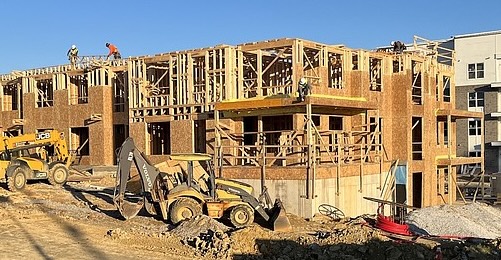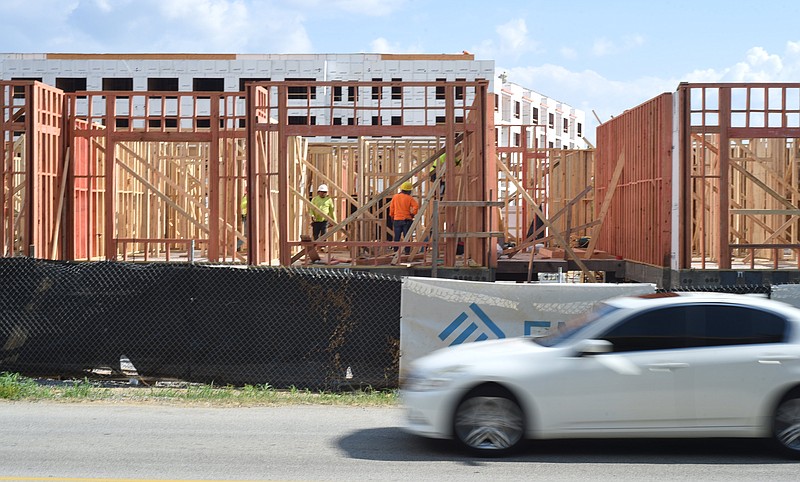With more people and businesses moving to the Volunteer State, Tennessee is expected to outperform the national economy again in 2024 and avoid a recession next year, according to the top economists at the University of Tennessee.
In its annual economic forecast for the state released Tuesday, the UT Boyd Center for Business and Economic Research projects that Tennessee's economy will grow 3.3% this year, outpacing the national growth rate of 2.4%, and grow another 1.8% next year, again growing faster than the projected U.S. growth pace of 1.4% for 2024.
Larry Kessler, research associate professor at the Boyd Center and project director for the annual forecast, said higher interest rates from the tightening monetary policy by the Federal Reserve is slowing economic growth. But he said Tennessee is benefiting by an inflow of residents and businesses into the state even after the stimulus-propelled growth during the pandemic has ended. In a conference call with reporters Tuesday, Kessler said Tennessee's population grew 1.2% last year — three times faster than the national average — adding nearly 82,000 more residents through domestic in-migration in 2022.
By the numbers
In their annual economic forecast for Tennessee, economists at the University of Tennessee Boyd Center for Business and Economic Research project for the state's economy next year:
— 1.8%: economic growth, down from the 3.3% this year but still better than the 1.4% growth nationwide.
— 3.5%: annual average unemployment, up from the current 3.3% jobless rate in Tennessee.
— 33,800: net increase in employment, down from over 143,000 new jobs added in the past year.
— 4.7%: growth in personal income, down from 6.3% this year.
Source: 2024 Economic Report to the Governor of the State of Tennessee
"This is the highest level of domestic in-migration that we have ever seen for a single year and this is really important because population growth is a strong contributor to overall economic growth," Kessler said. "Population growth is a key component of economic growth, as it creates a larger labor force, more consumption spending and more economic activity in general."
But the growth in the state is coming with a price, especially for those trying to buy or rent a home for the first time in many of Tennessee's fastest growing cities.
Rising home prices
Tennessee home prices, which historically have been lower than the rest of the country, rose much faster over the past three years, and the average price in major markets in Tennessee is now higher than the U.S. average. As of September, Tennessee listing prices averaged more than $20,000 higher than those in the U.S. In the rapidly growing Nashville market, active listing prices are nearly $150,000 higher than the national average, Kessler said. In Knoxville, home prices average roughly $45,000 higher than the national average, according to data compiled by UT researchers.
"We've seen a surge in home prices over the past several years," Kessler said. "There's been an increase in demand as more people move to the state, but the supply of houses being built or coming on the market hasn't kept pace with that growth, and higher interest rates have made home affordability a real challenge for many people."
 Staff Photo by Dave Flessner / Developers are building a 344-unit, garden-style apartment community, seen Nov. 7, on 15 acres along Gunbarrel Road next to the Village at Waterside shopping center near Interstate 75 and Shallowford Road. Known as the Populus Waterside, the four-story apartment complex is being built to help accommodate the growing number of residents in Chattanooga.
Staff Photo by Dave Flessner / Developers are building a 344-unit, garden-style apartment community, seen Nov. 7, on 15 acres along Gunbarrel Road next to the Village at Waterside shopping center near Interstate 75 and Shallowford Road. Known as the Populus Waterside, the four-story apartment complex is being built to help accommodate the growing number of residents in Chattanooga.Rising material costs, a shortage of construction workers and land zoning restrictions have combined to push up costs and limit enough housing construction across the state, especially for lower- and moderate-income home buyers, Kessler said.
Rental rates have also jumped by about 30% in Tennessee over the past three years, again outstripping average wage gains for most households.
(READ MORE: Chattanooga home prices nearly double in the past five years)
According to the National Association of Realtors, home prices in Chattanooga are still below the U.S. median, however. In October 2022 — the most recent month for which comparable data is available — the median home price in Chattanooga was $315,000, or 20.5% less than the U.S. median sales price of $396,100.
But over the past three years, median home prices in Chattanooga haves still jumped by more than 55% from their pre-pandemic levels and have risen more than twice as fast as worker wages.
Historic lows for unemployment
Tennessee non-farm jobs expanded by a very strong 4.6% in 2022, representing an addition of over 143,000 workers, and the jobless rate in Tennessee fell in July and August to an all-time low of 3.1%.
Non-farm employment is projected to continue on that slower growth trajectory, growing by 33,800 jobs in 2024, or about 1%. By comparison, employment in the U.S. is projected to grow by a slightly slower 0.7% in 2024 and then see no growth in 2025.
In addition to stronger population growth in Tennessee, the state's stronger employment projections are also driven, in part, by a more favorable outlook for the state's manufacturing sector.
"Tennessee continues to see manufacturing job growth, and we project that this will continue throughout the forecast horizon," Kessler said in the economic report delivered to Gov. Bill Lee. "By comparison, the U.S. outlook is calling for a contraction in manufacturing employment, which will put downward pressure on overall non-farm employment growth for the nation."
Tennessee's unemployment rate, which measures the percentage of people who are not working but are actively looking for work, is expected to drift higher as interest rate hikes take a toll on interest-sensitive industries like housing, construction and automobiles. As a result, Kessler predicts the state's jobless rate will increase to 3.5% in 2024 and 3.6% in 2025. Tennessee's jobless rate is forecast to remain below the national rate over the next couple of years as the U.S. rate rises to 4.7% by 2025.
"From an historical standpoint, this is still an incredibly low rate of unemployment and still represents a very healthy labor market," Kessler said.
(READ MORE: Tennessee business leaders more optimistic about local economy than the U.S. economy)
Nominal personal income will grow by a strong 6.3% in 2023, but then advance by a more moderate and historically normal rate of 4.7% in 2024, Kessler predicts. After adjusting for inflation, real personal income is projected to increase by 2.4% this year and by 2.7% in 2024.
Business applications in Tennessee between 2019 and 2022 grew by 55.3%, which represents an additional 32,570 applications in 2022 compared to 2019. Nationwide, business applications grew by 44.1% in the same period.
Contact Dave Flessner at dflessner@timesfreepress.com or 423-757-6340.

